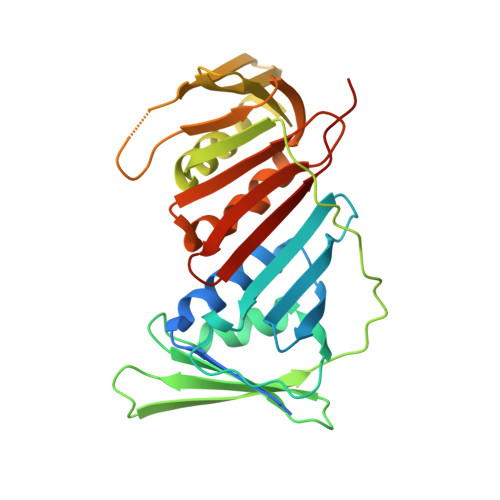Cytosolic PCNA interacts with p47phox and controls NADPH oxidase NOX2 activation in neutrophils.
Ohayon, D., De Chiara, A., Dang, P.M., Thieblemont, N., Chatfield, S., Marzaioli, V., Burgener, S.S., Mocek, J., Candalh, C., Pintard, C., Tacnet-Delorme, P., Renault, G., Lagoutte, I., Favier, M., Walker, F., Hurtado-Nedelec, M., Desplancq, D., Weiss, E., Benarafa, C., Housset, D., Marie, J.C., Frachet, P., El-Benna, J., Witko-Sarsat, V.(2019) J Exp Med 216: 2669-2687
- PubMed: 31492810
- DOI: https://doi.org/10.1084/jem.20180371
- Primary Citation of Related Structures:
6FCM, 6FCN - PubMed Abstract:
Neutrophils produce high levels of reactive oxygen species (ROS) by NADPH oxidase that are crucial for host defense but can lead to tissue injury when produced in excess. We previously described that proliferating cell nuclear antigen (PCNA), a nuclear scaffolding protein pivotal in DNA synthesis, controls neutrophil survival through its cytosolic association with procaspases. We herein showed that PCNA associated with p47phox, a key subunit of NADPH oxidase, and that this association regulated ROS production. Surface plasmon resonance and crystallography techniques demonstrated that the interdomain-connecting loop of PCNA interacted directly with the phox homology ( PX) domain of the p47phox. PCNA inhibition by competing peptides or by T2AA, a small-molecule PCNA inhibitor, decreased NADPH oxidase activation in vitro. Furthermore, T2AA provided a therapeutic benefit in mice during trinitro-benzene-sulfonic acid (TNBS)-induced colitis by decreasing oxidative stress, accelerating mucosal repair, and promoting the resolution of inflammation. Our data suggest that targeting PCNA in inflammatory neutrophils holds promise as a multifaceted antiinflammatory strategy.
Organizational Affiliation:
Institut National de la Santé et de la Recherche Médicale U1016, Centre National de la Recherche Scientifique UMR 8104, Université Paris-Descartes, Cochin Institute, Paris, France.














